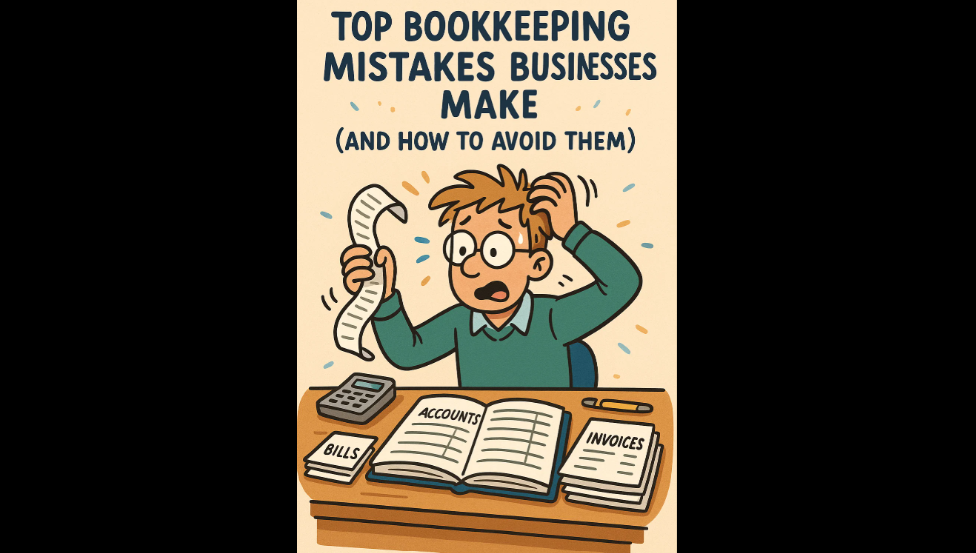Bookkeeping is Not for Everyone — And That’s Okay
Everyone is built different — and if there’s one thing I’ve learned from years of bookkeeping in for-profit and nonprofit settings, it’s that bookkeeping is not for everyone. Just like some people are naturally tech-savvy, others have an edge when it comes to numbers and accounting.
And this could be one of the biggest reasons why people struggle with bookkeeping. It’s just not their natural aptitude. I’m not just talking about business professionals — even some people who study accounting have trouble keeping up with the pace of tracking transactions and keeping their books up to date.
I’ve even come across established CPAs who bring in profitable clients, only to have them incur penalties because they couldn’t manage the books properly. And the poor business owners are left wondering: If a CPA can’t do it right, then who can?
At the heart of it, good bookkeeping is about more than numbers. It’s about organization, discipline, financial literacy, and having the acumen to track everything happening in an organization in accounting terms. It’s like telling the story of a company using numbers. You have to keep the big picture in mind while staying on top of the day-to-day details — and you must be disciplined enough to stick to the schedule, whether you’re doing it part-time or full-time.
When a construction client onboarded me, they were already paying a CPA on retainer. A full year’s worth of bookkeeping had to be completed. After just 4-5 hours of quietly reviewing their year’s worth of transactions, I told them it would take me anywhere from 2 weeks to 2 months to catch up. I based this analysis on my own experience handling similar (and even worse) backlogs — and my natural tendency toward this field.
We were completely caught up in just 2.5 weeks.
1. Doing Your Own Bookkeeping Without the Right Skills
The first mistake is trying to DIY your bookkeeping when you don’t have the right financial skills or mindset. If you don’t naturally think in accounting terms — tracking debits, credits, categorizing transactions, reconciling bank statements — you’ll always be playing catch-up. Worse, you’ll misclassify things, miss tax deductions, and end up paying for it later, sometimes literally with penalties and interest.
The Fix:
If you’re not confident with basic accounting, outsource it. Find someone who understands both the day-to-day work and the bigger picture behind the numbers. Not everyone can “read” business health through financials — but the right bookkeeper can.
2. Don’t Rely Too Much on Titles
One of the biggest mistakes I see business owners make is hiring based purely on titles. Credentials matter — but they don’t guarantee someone will have the discipline, organization, or financial storytelling ability needed for high-quality bookkeeping.
Just like the construction client who assumed a CPA would make their life easier — they ended up paying unnecessary penalties because the CPA couldn’t keep track of their financial deadlines and failed to organize their books in time.
Take the time to really understand someone’s experience with bookkeeping. Ask questions. Are they juggling dozens of clients? Or will you get personalized service from someone who truly knows your business?
As a general rule of thumb:
If someone is handling 500–600 transactions a month, it shouldn’t take more than 1–2 weeks (at 3–4 hours a day) to stay on top of it. If they take longer, even with shiny credentials, it might be a sign they’re not naturally cut out for it.
3. Poor Documentation
You might be surprised, but poor documentation is a major red flag — and I’ve seen it firsthand.
Once, I was brought in to do bookkeeping for a major charity organization averaging 500-600 transactions a month. One of the best ways to gauge how much work bookkeeping will involve is to look at the monthly bank transaction volume — a trick I developed over years of hands-on experience.
Despite having a “seasoned” CPA, the charity’s documents were a mess. Piles of random papers were everywhere, both online and offline, with no clear system. It was chaos. Their desktop was literally swarming with files upon files, with no clarity whatsoever about what on earth was going on. Just looking at all those files made you go nuts. First thing I did? I moved everything into a single folder — and since then, there hasn’t been a single file saved on the desktop.
If you need to stack files on your desktop just to stay organized, then you’re probably not built for this.
The CRA requires businesses to keep six years of records — but that doesn’t mean you need to hoard every piece of paper. A good bookkeeper knows how to organize smartly, digitizing where needed and maintaining clean, minimal, audit-proof records.
I didn’t just organize my clients’ documents — I loved doing it. It’s second nature to me.
4. Fear of Bank Reconciliation
When I replaced an accountant for a well-known trading firm, I was first assigned to work alongside them. I remember one of their first questions to me — almost with fear — was:
“Do you know bank reconciliations?”
When I reviewed the books, I understood why: they hadn’t reconciled their banks in over a year.
Reconciliation is scary for many — but to me, it’s just another part of financial storytelling. It’s how you back up what your books say using a trustworthy external source — your bank.
Think of it like citations in an essay. It proves you’re not making things up — the bank records match your numbers.
A good rule: if your monthly reconciliation isn’t completed by the 5th or 6th of the following month, it’s a red flag. It shows your bookkeeper may not be able to keep pace with the volume of transactions — no matter how good they “look” on paper.
5. Over-Relying on Software
If there’s anything I’ve learned, it’s that there’s no one-size-fits-all accounting software solution. Every software has its pros and cons. No single platform can do it all.
That’s why accountants are taught skills like journal entries — to fill the gaps that software can’t cover.
At one firm, I helped them transition from a major platform like QBO (QuickBooks Online) to a custom-made solution full of bugs and lags. I worked closely with the development team to help build a better revenue module — one that reflected real accounting needs.
The final tip I’ll leave you with today:
Don’t rely too heavily on software. Always ask yourself:
“Is this really the best and most effective way to record this?”
Keep thinking, keep challenging yourself, and stay flexible.
Final Thoughts
I could go on and on about the bookkeeping woes businesses face — but my real purpose here is to give you red flags to watch out for and solid measures to avoid these mistakes.
In most cases, it comes down to people — not titles, not math skills alone — but a rare combination of speed, financial dexterity, discipline, and experience.
I work with engineers, financial heavyweights, and some of the most creative business owners. Over time, many come to respect me not just because I can “do math,” but because I bring real skills, real results, and real value to their businesses.
Bookkeeping is not for everyone.
And that’s perfectly okay — as long as you make sure it’s done right.




